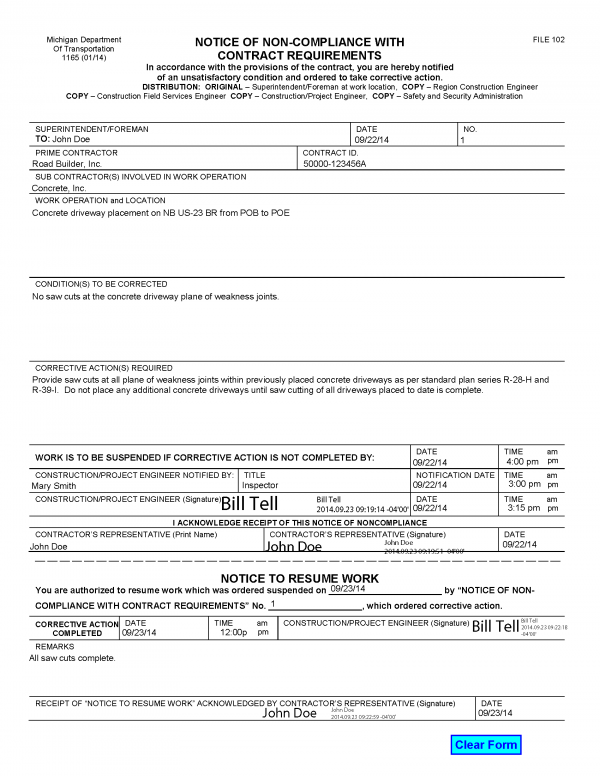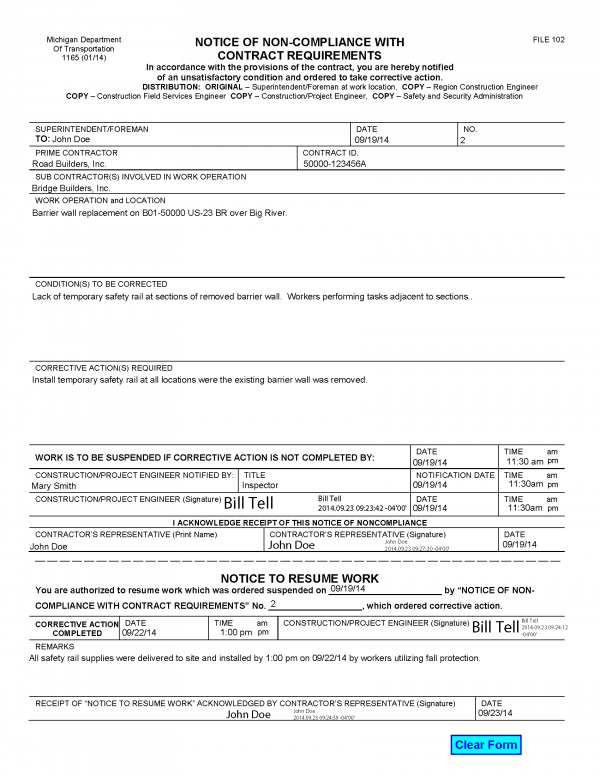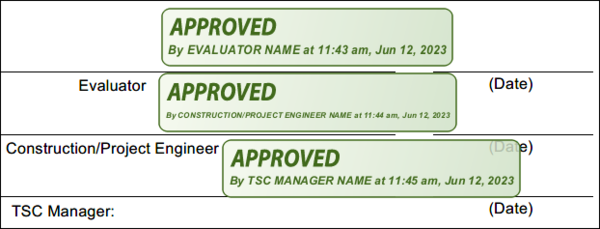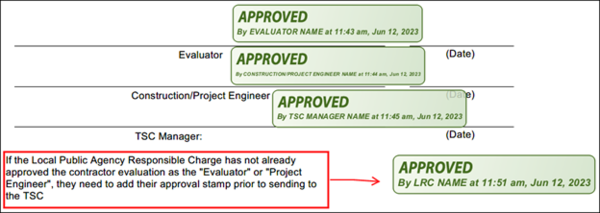Difference between revisions of "102.19 Evaluation of Contractor Performance and Contract Non-Compliance"
| Line 4: | Line 4: | ||
<center>[mailto:Change?body=https://mdotwiki.state.mi.us/construction/index.php/102.19_Evaluation_of_Contractor_Performance_and_Contract_Non-Compliance Email this Page]</center> | <center>[mailto:Change?body=https://mdotwiki.state.mi.us/construction/index.php/102.19_Evaluation_of_Contractor_Performance_and_Contract_Non-Compliance Email this Page]</center> | ||
__forcetoc__ | __forcetoc__ | ||
| + | |||
| + | ==[[#Contractor Performance Evaluation (CPE) and Notice of Non-Compliance with Contract Requirements Transition for MDOT Trunkline Projects | Contractor Performance Evaluation (CPE) and Notice of Non-Compliance with Contract Requirements Transition for MDOT Trunkline Projects]]== | ||
| + | |||
| + | MDOT is implementing a shift away from Contractor Performance Evaluations (CPE), instead engineers may use the 1165 form for issues with contract non-compliance when dialogue with the Contractor has failed to produce an acceptable result. This transition will take place over several years, with MDOT Trunkline projects being the first projects to stop performing Contractor Performance Evaluations. As a result of this, MDOT will maintain both processes below: Contractor Performance Evaluations, and Notice of Non-Compliance. | ||
| + | |||
| + | Issuance of non-compliance in lieu of Contractor Performance Evaluation will begin for all MDOT Trunkline projects with final completion dates on or after June 5, 2024. Additional information on the transition can be found in [https://mdotwiki.state.mi.us/construction/index.php/102.01_Prequalification_of_Bidders#Contractor_Performance_Evaluation_.28CPE.29_and_1165_Form_for_Non-Compliance_Transition 102.01 Prequalification of Bidders] | ||
| + | |||
| + | Please review the Special Provision: [https://mdotjboss.state.mi.us/SpecProv/getDocumentById.htm?docGuid=628a1c7e-9726-4d89-9961-639c84250a8d&fileName=%2220SP-102D-01.pdf%22 20SP-102D-01 Non-Compliance with Contract Requirements] for more details. | ||
| + | |||
==[[#Notice of Non-Compliance with Contract Requirements for MDOT Trunkline Projects | Notice of Non-Compliance with Contract Requirements for MDOT Trunkline Projects]]== | ==[[#Notice of Non-Compliance with Contract Requirements for MDOT Trunkline Projects | Notice of Non-Compliance with Contract Requirements for MDOT Trunkline Projects]]== | ||
Revision as of 10:39, 22 August 2023
Contractor Performance Evaluation (CPE) and Notice of Non-Compliance with Contract Requirements Transition for MDOT Trunkline Projects
MDOT is implementing a shift away from Contractor Performance Evaluations (CPE), instead engineers may use the 1165 form for issues with contract non-compliance when dialogue with the Contractor has failed to produce an acceptable result. This transition will take place over several years, with MDOT Trunkline projects being the first projects to stop performing Contractor Performance Evaluations. As a result of this, MDOT will maintain both processes below: Contractor Performance Evaluations, and Notice of Non-Compliance.
Issuance of non-compliance in lieu of Contractor Performance Evaluation will begin for all MDOT Trunkline projects with final completion dates on or after June 5, 2024. Additional information on the transition can be found in 102.01 Prequalification of Bidders
Please review the Special Provision: 20SP-102D-01 Non-Compliance with Contract Requirements for more details.
Notice of Non-Compliance with Contract Requirements for MDOT Trunkline Projects
Engineers may engage the contractor throughout the life of a contract using Form 1165, Notice of Non-Compliance with Contract Requirements. Form 1165 will be used to communicate contractor non-compliance and to provide timeframes for remedy of the non-compliance issues as applicable. Multiple notices of non-compliance may be necessary depending on project specific circumstances. The Engineer will document each condition of non-compliance independent from other non-compliance conditions. The Engineer will select the type of non-compliance on the 1165 form. The type of non-compliance may assist the Contract Performance Evaluation Review Team and/or MDOT’s Prequalification Committee when reviewing patterns and trends. The Engineer will sign the form and enter the date and time the Contractor is notified.
The following conditions are options to be selected under the “condition to be corrected” section of the form:
- Jobsite Safety
- Prevailing Wage
- Subcontract
- Prompt Payment
- Disadvantaged Business Enterprise
- Soil Erosion and Sedimentation Control (SESC)
- Plans and Specifications
- Prosecution and Progress
- Submittals (material testing, certifications, shop drawings, etc.)
- Work Zone Safety and Mobility
- Other
Form 1165 also allows the Engineer to suspend non-compliant work operations due to one or more non-compliance conditions in accordance with subsections 104.01.B and 107.01 and require corrective action to take place by a specific date. Not every non-compliance condition will warrant a work operation suspension. Some of the items noted above are operations that may warrant a work operation or project wide suspension at the discretion of the Engineer. The non-compliant condition requiring suspension will be clearly and concisely stated by the Engineer with a reasonable time frame for the contractor to correct the condition. If corrective action has not been completed within the specified time, the work operation should remain suspended, and the Engineer may pursue a project wide suspension. When corrective action has been taken within the specified time frame, the “Notice to Resume Work” section of the form will be completed by the Engineer and distributed as indicated on the form. The purpose of the “Notice to Resume Work” is to authorize the Contractor to resume the work activity that was previously suspended. This portion of the form should not be used when there has been no suspension of work.
Non-Compliance of Jobsite Safety
When the Contractor fails to meet the safety requirements of the contract, the Contractor’s own safety program, or other safety orders as required by other agencies such as MSP, MIOSHA, etc., the Contractor may be in non-compliance with the contract. The Engineer may issue Form 1165 to the Contractor and may suspend the non-compliant work or issue a project wide suspension based on project specific circumstances until satisfactory resolution of the safety non-compliance is completed and acknowledged by the Engineer allowing any suspended work to resume.
Non-Compliance of Prevailing Wage
When the Contractor fails to meet the requirements of any of the following: subsection 107.01 of the Standard Specifications for Construction, the Special Provision for Prevailing Wage and Labor Compliance System (20SP-104D), or the Special Provision for Labor Compliance (20SP-107D) or other contract documents, the Contractor may be in non-compliance with the contract. The Engineer may issue form 1165 to the Contractor along with any additional requirements including non-compliance damages as outlined by the Standard Specifications for Construction or applicable special provisions.
Non-Compliance of Subcontracting, Prompt Payment, or DBE Compliance
When the Contractor fails to meet the requirements of any of the following: subsections 102.17 or 108.01 of the Standard Specifications for Construction, the Special Provision for Prompt Payment (20SP-109A), or the Special Provision for Utilizing Disadvantaged Business Enterprise Trucking Vendors (20SP-108C) or other contract documents, the Contractor may be in non-compliance with the contract. The Engineer may issue form 1165 to the Contractor and may suspend the non-compliant work or issue a project wide suspension based on project specific circumstances until satisfactory resolution of the subcontract non-compliance is completed and acknowledged by the Engineer allowing any suspended work to resume along with any additional requirements outlined by the Standard Specifications for Construction or applicable special provisions.
Non-Compliance of Soil Erosion and Sedimentation Control
When the Contractor fails to meet the requirements of any of the following: subsections 107.23, 205.03, 208.03, 705.03.C, 706.03.N, 712.03.Q, or 816.03 of the Standard Specifications for Construction, the Soil Erosion and Sedimentation Control Manual, or the Special Provision for Non-Compliance with Soil Erosion and Sedimentation Control Requirements (20SP-208A) or other contract documents, the Contractor may be in non-compliance with the contract. The Engineer may issue form 1165 to the Contractor and may suspend the non-compliant work or issue a project wide suspension based on project specific circumstances until satisfactory resolution of the SESC non-compliance is completed and acknowledged by the Engineer allowing any suspended work to resume along with any additional requirements including non-compliance damages as outlined by the Standard Specifications for Construction or applicable special provisions.
Non-Compliance with plans and/or specifications
When the Contractor fails to meet the requirements of any contract specifications noted in the plans, Standard Specifications for Construction, or other contract documents, the Contractor may be in non-compliance with the contract. The Engineer may issue form 1165 to the Contractor and may suspend the non-compliant work or issue a project wide suspension based on project specific circumstances until satisfactory resolution of the plan/specification non-compliance is completed and acknowledged by the Engineer allowing any suspended work to resume along with any additional requirements outlined by the Standard Specifications for Construction.
Non-Compliance with Prosecution and Progress
When the contractor performs work prior to award, doesn't perform work according to the progress schedule, or doesn't have sufficient resources to adequately complete the work within the contract time. The Engineer may issue form 1165 to the Contractor and may issue a project wide suspension based on project specific circumstances until satisfactory resolution of work progress is completed and acknowledged by the Engineer allowing any suspended work to resume along with any additional requirements outlined by the Standard Specifications for Construction.
Non-Compliance with Contract Submittals
When the Contractor fails to meet the requirements of any of the following: subsections 104.02, 104.03, 105.01, 105.05, 105.10, 406.03, 704.03, 706.03, 707.03, 713.03, or 716.03 of the Standard Specification for Construction, the Special Provision for Source of Steel and Iron (20SP-105A), the Special Provision for Source of Construction Materials (20SP-105B), the Special Provision for Complex Structure Demolition Plan (20SP-204D), the MDOT Shop Drawing Review Process, or the Materials Quality Assurance Procedures Manual or other contract documents, the Contractor may be in non-compliance with the contract. The Engineer may issue form 1165 to the Contractor and may suspend the non-compliant work or issue a project wide suspension based on project specific circumstances until satisfactory resolution of the submittal non-compliance is completed and acknowledged by the Engineer allowing any suspended work to resume along with any additional requirements outlined by the Standard Specifications for Construction or applicable special provisions.
Non-Compliance of Work Zone Safety and Mobility
When the contractor fails to meet the requirements of any of the following: subsections 104.11 or 812.03 of the Standard Specifications for Construction, the project specific Special Provision for Maintaining Traffic, special provisions designated as applicable to section 812 of the Standard Specifications for Construction, or work zone and mobility related plans/drawings and other contract documents, the Contractor may be in non-compliance with the contract. The Engineer may issue form 1165 to the Contractor and may suspend the non-compliant work or issue a project wide suspension based on project specific circumstances until satisfactory resolution of the work zone and mobility non-compliance is completed and acknowledged by the Engineer allowing any suspended work to resume along with any additional requirements including non-compliance damages as outlined by the Standard Specifications for Construction or applicable special provisions.
Non-Compliance: Other
When the Contractor fails to meet any contract requirements not previously described, the Contractor may be in non-compliance with the contract. The Engineer may issue form 1165 to the Contractor and may suspend the non-compliant work or issue a project wide suspension based on project specific circumstances until satisfactory resolution of the special provision or “other” non-compliance is completed and acknowledged by the Engineer allowing any suspended work to resume along with any additional requirements outlined by the special provision or as referred to by the Standard Specifications for Construction.
1165 Contract Compliance Example 1
1165 Health and Safety Example 2
Contractor Performance Evaluation (CPE)
A project let through the MDOT letting process will require the project management staff to evaluate the prime and subcontractor(s) performance at the completion of each project, or at the end of each year for multiple year projects. A final estimate cannot be produced until all CPEs are approved in FieldManager; therefore, timely evaluation of the contractor is important. A CPE may also be completed at the end of a warranty period or at any interim project date management staff deems appropriate. Instructions and rating criteria for completing the CPE are available in FieldManager. The Contractor Evaluation Factors and Rating Criteria are published on the MDOT website.
Forward the completed CPE to the respective contractor or subcontractor(s) by e-mail.
Within 21 days of the date of receipt of a performance evaluation, the contractor may make a written request to meet with project management staff to review an evaluation. As a result of this meeting, the evaluation may be left unchanged or revised as deemed appropriate by the Engineer. The Engineer will then give the contractor written notice with the final performance evaluation. If the meeting is not requested within the 21-day period, the original evaluation becomes final and will not be subject to later contest or appeal.
The Engineer may require the contractor to submit a performance improvement plan to address needs identified in an interim CPE, and appear for a meeting to discuss the improvement plan. Upon the Engineer’s approval of the plan, the contractor will be required to immediately implement the plan.
If the contractor does not agree with an Engineer’s final performance evaluation or the Engineer’s requested changes to a contractor’s improvement plan, the appeal process is as follows:
Within 14 days after the date a performance evaluation becomes final and is sent to the contractor, they may file a written appeal of any rating of seven or below to the Engineer. The written appeal shall contain documentation supporting the contractor’s position that the rating is not warranted. If no appeal is filed within the 14-day period, the evaluation becomes final and will not be subject to later contest or appeal.
If the contractor files an appeal, the Engineer shall contact the Construction and Technology Division’s Construction Contracts Unit to schedule an appeal meeting. An appeal filed by a contractor will be considered by a Contractor Performance Evaluation Appeal (CPEA) Panel. The panel shall be composed of three licensed professional Engineers from the department (following the format of a Central Office Review Panel) who were not directly involved in the management of the project. This panel will review appeals on all evaluations and/or performance improvement plan for this project. The contractor and the Engineer must submit supporting documentation relevant to the appeal and will attend a formal appeal hearing. The panel may visit a project site and gather information to assist them in making an informed decision, if necessary. Upon concluding its review, the panel will confirm or modify the evaluation and/or improvement plan. The panel will send the contractor and Engineer written notice of its decision within 30 days, along with a copy of the modified evaluation, if applicable. The decision of the panel constitutes the final department decision and is not subject to further contest or appeal.
Interim CPEs cannot be appealed to the CPEA Panel.
If a contractor fails to honor a request by project management staff to submit a performance improvement plan, meet to discuss such a plan, or implement an approved performance improvement plan, the failure may be used as a basis for modifying the prequalification ratings of the contractor. Any action to modify the contractor’s prequalification ratings will be taken in accordance with the duly promulgated prequalification rules. ________________________________________
Processing of Contractor Performance Evaluations
The final approval on a contractor performance evaluation is the respective TSC Manager. It must be noted that this approval is not to be delegated to staff that report to the TSC Manager. The approval must be made by the respective TSC Manager or another TSC Manager in the region or an equivalent position or higher in the region office. This requirement ensures an independent review of the contractor evaluation by a person not directly managing or providing oversight of the project.
A pdf review stamp must be applied at the bottom of contractor performance evaluation by the evaluator, Engineer and TSC Manager. The pdf stamp must include the Reviewer’s Name, Date, and Time.
Interim contractor evaluations are strongly encouraged to provide feedback on performance issues or to immediately note performance deficiencies. Construction staff should not wait until the end of a project to provide extremely low ratings. MDOT’s goal is to provide contractor evaluations upon discovery of performance challenges, open communications and work cooperatively to improve performance. Final contractor performance evaluations with very low numbers may be appropriate if interim evaluations have been disregarded by the contractor.
If a contractor performance evaluation appeal proceeds to central office the appeal hearing binder must be prepared as a central office claim review hearing binder is prepared. The region is to create the central office binder with both the Engineer and contractor’s positions included and tabbed for reference. All documentation to address the position of each party must be included in the binder.
LAP Project Considerations
The local agency will follow the most recent MDOT procedures for contractor performance evaluations. The LRC must approve all CPE’s prior to routing to the DR for execution by the TSC Manager.
In the event the Engineer requires the contractor to submit a contractor performance improvement plan, the LRC must also approve. The DR must be notified of any contractor performance improvement plans.
If the contractor makes a request to review an evaluation, the Engineer, LRC and the DR must attend the project level meeting. If the contractor files a CPEA, the Engineer, LRC and the DR must attend the appeal hearing.



